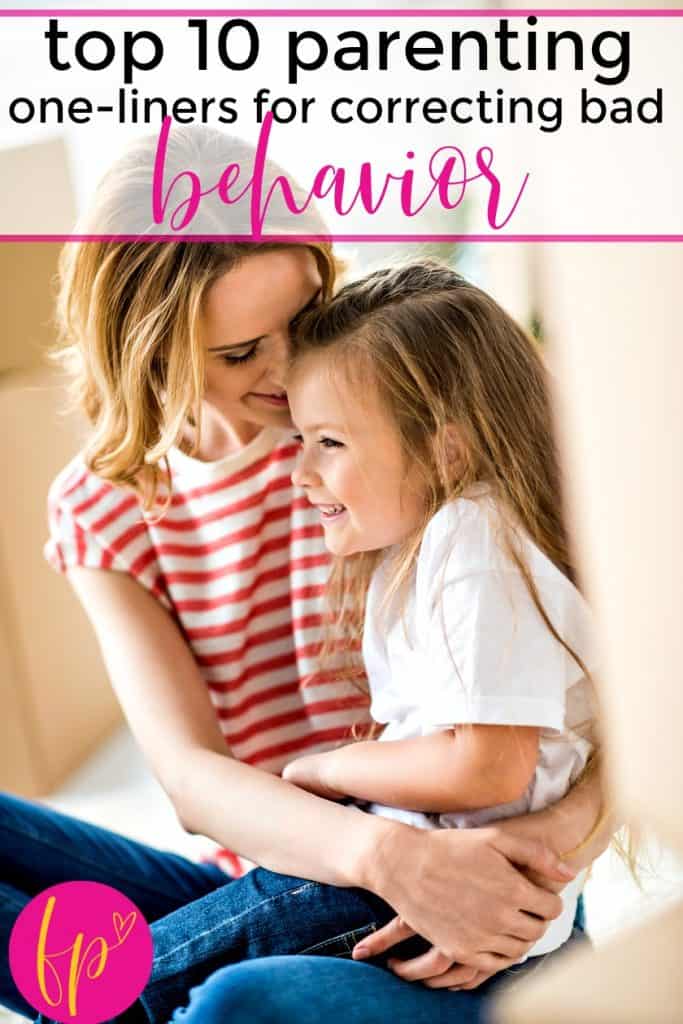Top 10 Parenting One-Liners For Correcting A Child’s Bad Behavior.
Table of Contents
You know when you hear another mom say some great parenting one-liner to her child, and you think to yourself, “Woah! That is really good! I’ll be using that!” A good parenting one-liner for correcting a child’s bad behavior, can fix a bad attitude, refocus perspective, stop whining, or any number of other child training issues with just a few words.
I’m all about as few words as possible. Children are too busy both in their bodies and in their brains to listen to long speeches. Parenting in the early years of a child’s life is all cause and effect.
One-Liners Are Good Parenting
This is why one-liners are so great. They train your child to respond to a short string of words in a particular way. This is the same reason correctly counting 1 – 2 – 3 for toddlers and preschoolers is so effective IF YOU DO IT RIGHT (I won’t chase that rabbit trail right now.)
Note: This site may earn from qualifying purchases through affiliate links at no extra cost to you.
So for today, I am going to give you my list of super-effective/favorite parenting one-liners. But before I do, I want you to know that while these words can be very effective, it’s actually the actions that back up the words that make them so powerful. Find out more about how to follow through in your parenting here.
I’ll give you one example of what I mean before we move on so that you can carry the understanding with you as you read through the list.

What Is A Good Parenting One-Liner?
For instance, one of my very favorite parenting one-liners is: “I can’t understand your words when you sound like that!”
This is what I use when my toddler/preschooler is trying to communicate something but doing so in a whiny voice. While I actually do understand him and know what he wants, I won’t respond until he talks in a pleasing voice.
I’ll coach him a handful of times on the right words to use and the right tone to say them in. I make him repeat after me 3-4 times until he gets it right, then, and only then, will I give him what it is he wants.
After a few times of this, all I need to say is, “I can’t understand you.” And he knows what to do. He’ll try again and again until he gets it right, knowing that he won’t get what he wants until he does.
OK then, so you get it, right? Great!
Top 10 Parenting One Liner’s For Correcting A Child’s Bad Behavior
#1. I Can’t Understand You
I used this as an example because it’s just so good. A family member once told me how nice it was to be around my kids because they didn’t whine. At that moment, I considered all the time and effort I had put into training them how to speak pleasantly and knew it was all worth it. Their communication made people enjoy their company. Win!
#2. Have You Counted the Costs?
The longer you are intentionally parenting your child, the better this works. After months and years of both good and bad consequences, you can use this line to make them pause; stop and consider their behavior, and respond appropriately instead of irrationally.
#3. What Would You Want Done to You?
Matthew 7:12 reminds us of the importance of empathy. Instruct a child to sit for a minute and consider if what they’re doing would be a positive experience if it was done to them.
#4. What Would You Want Said to You?
As with number 3, this works well to make your child consider the words she is using. Asking herself this question forces her to think objectively about her words. What if someone was saying them to me? How would I feel? Wow, that would hurt, I should not be saying these words to others.
#5. That’s Not Who You Are
This is another one that works great when paired with intentional parenting. When you have spent a lot of time teaching a child she is created to be a reflection of Christ and that your family represents and stands for godliness, she is able to consider whether her actions line up with these things or not and will help her refocus her perspective.
#6. You Must ________ Now.
I heard another parenting expert use the must & now example at a conference once and we have implemented it ever since. The man speaking was asked to come up with processes to help the military train new recruits. He found that when an authority figure delivers commands, he or she must be completely clear. Meaning you should say exactly what you want to be done and when you want it done. For instance, using the words, “You Must Go To Bed Now,” lets your child know it is unarguably bedtime right now. Anything outside of this is frustrating for a child and makes it difficult for them to do the right thing.
#7. I Want To Say Yes.
For a while, we had a hard time with forts in our house. The kids wanted to make forts in their rooms and sleep in them, like every night. I am all about saying yes to as much fun and bonding as possible, but they were not picking up their rooms afterward. So we had a talk about how I won’t be saying yes anymore to forts until they started showing me improved responsibility. Let your child be responsible for getting a ‘yes!’
#8. I Love You Too Much To Let You Do That.
I tell my kids this: If I saw you walking towards a cliff, I would run as fast as I could and tackle/pummel you if it meant stopping you from going off the edge. Love does not allow someone to stay comfortably in their sin.
#9. You Don’t Have To Understand.
Parents regularly get caught up in the trap of falsely thinking they have to explain everything to their children. You don’t. It is great to discuss what your family stands for, why you function as you do, and what your vision is as a whole. However, there are all kinds of cognitive abilities that your child does not have yet. So trying to explain every decision you make is a huge waste of time and counterproductive as it only serves to exasperate a kid.
#10. No.
There is so much information floating around about what is and is not good parenting. What is good for your child and what isn’t. One such topic is about using the word NO with your child. Here’s what I’d like you to consider: your child will hear NO for various reasons for the rest of his life. Sometimes the answer is just NO. When there’s not enough money, when the prognosis isn’t good, when she didn’t get invited. A well-adjusted, all-around healthy child knows how to process a No.
Raising A Great Kid
I believe there are a handful of biblical parenting principles, that when applied can make your parenting efforts effective to a far greater degree than you’ll hear about on social media. The world loves to run parenting through the mud. But the truth is, there are families enjoying a level of joy and peace that others don’t realize is possible. Their secrets aren’t secrets. They’re available to you. Tap into all that God has for you. His word says Ha has abundantly more than we could ask or imagine for us. Parenting and motherhood are not excluded from this!
Sometimes we just need to be reminded to take a deep breath and be grown-ups. Sometimes all we need is to say only a few words.



Hey Shelly,
I’m picking up very important things to say in the middle of an a
rgument and dealing with the whys..My kids whine a lot as and this will help.
Great one-liners.
“Asked and answered” is another good one I’ve used multiple times with my preteen. When she and her friends don’t get the answer they want re a sleepover, going for ice cream etc and keep badgering I give them that. I may have to say it a couple times but they get it and stop.
I’m notorious for saying, ” I love you but no!” Works for cash outs loaded with treats or behaviors that are unacceptable in public and at home.
I love the one about telling them that they don’t have to understand. I get super frustrated trying to explain something to my daughter of why she can’t do something, or why we need to do something, or other things in general. She gets frustrated and I get frustrated because I know she can’t understand what I’m talking about, since she’s only seven. Thanks so much.
Love this practical list! Thank you for taking the time to write this out.
Another good one liner for back talking is “I love you too much to argue about that “.
These are all great! One that I use often is “Asked and answered.” This helps immensely with the buts, whys, and negotiating that ensues after a question is asked and they do not like the answer I have given. “Asked and answered.” stops all the back and forth between us.
Nice one 🙂 Thanks for saying hello, Shay!
These are all so powerful. I often fall into the trap of trying to explain my reasoning. I get so frustrated and then stop, regroup, and explain that it’s not something they need to know. Thank you for sharing these!
Hey Stephanie! Explanation station is an easy trap to fall in to! And it gets more difficult, the older a child gets. Thanks for saying hello!